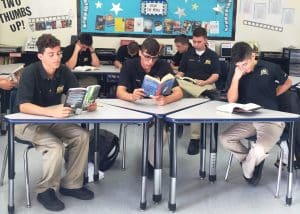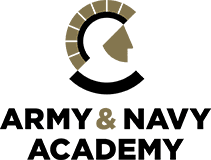
In addition, we will explore various causes, including impacts on English language learners and how learning differences like dyslexia and dyspraxia, and even ADHD, can be an underlying cause of spelling issues.
Although mainly directed toward teachers in public and private schools, the information provided here may also prove useful to parents and students. Learn more about how to detect signs of spelling issues, resources to diagnose, and ways to improve spelling.
Signs of a Spelling Disorder
If you are concerned about middle schoolers and high schoolers and their trouble spelling, there are some ways to identify issues and possible causes.
For instance, at private schools like Army and Navy Academy, a college preparatory day and boarding school, they do assessments to determine if there are learning issues. In addition, they offer support services to help students ignite their passion for learning, improve study habits and work on writing skills, including spelling.
The Academy’s programs and specialized support services include: writing across the curriculum, Learning Strategies for students with learning differences and elective classes for English for Speakers of Other Languages (ESOL/aka EL and ESL).
All middle and high school students at this private school for grades 7-12 are offered after-school tutorials with faculty, peer tutoring, faculty evening office hours and mandatory study time. These supports help reinforce reading and writing skills.
How to Identify Spelling Issues:
- Does the student seem to apply spelling rules or know basic rules for spelling?
- Did the teen learn phonics as a child in elementary school, and if so, does the student appear to apply basic phonics when spelling?
- When you read over written work by a pupil, are you noticing the incorrect spellings on common words?
- Does the student mix up letters in words and reverse them?
- Does the student have trouble even identifying or noticing spelling mistakes?
- Does the middle schooler or high schooler spell the same exact words but in various ways?
- Does the student tend to write very slowly and/or illegibly?
- Does the middle school or high school student tend to write very few words rather than expand on what they have to say?
- Does the student come from a non-English speaking country and speak more than one language?
What Causes Trouble with Spelling
Whether you’re a teacher, student or parent, Identifying the cause of spelling troubles is essential to improvement in spelling. While one student may have focus issues, another student may have reading or writing problems, speak other languages, or have a learning difference affecting proper spelling. Let’s take a deeper dive into possible causes for spelling issues.
Dyslexia
- What is dyslexia? Dyslexia affects how students process language and has a significant impact on reading and spelling skill sets.
- Dyslexia causes spelling troubles because the student may have trouble with differences in sounds and even figuring out how to read or write words.
Dyspraxia
- What is dyspraxia? This is a disorder that affects speech and coordination (fine and gross motor skills).
- Dysgraphia causes reading and spelling issues because the student may not be able to put letters in the right order, remember shapes, or even be able to read their own writing.
Hearing Loss
- What is hearing loss? According to The World Health Organization, “disabling hearing loss refers to hearing loss greater than 35 decibels (dB) in the better hearing ear.”
- Hearing loss can cause distortion as sounds are transmitted to the auditory centers of the brain; this in turn, impacts a student’s ability to spell words correctly.
Language Awareness
- What is language awareness? The Association for Language Awareness defines “Language Awareness as explicit knowledge about language, and conscious perception and sensitivity in language learning, language teaching and language use.”
- Language awareness, for example, can affect international students because they are English language learners. Some schools, like Army and Navy Academy in California, actually have ESOL elective classes to support international students. These classes are taught by well-trained faculty so English language learners can practice reading, writing, speaking, and improve spelling. It is also important to note that socioeconomic and other factors can also be impediments in learning how to spell.
ADHD
- What is ADHD? The American Psychiatric Association indicates that “symptoms of ADHD include inattention (not being able to keep focus), hyperactivity (excess movement that is not fitting to the setting) and impulsivity (hasty acts that occur in the moment without thought).”
- ADHD students may have a hard time focusing, thereby, they may have trouble detecting spelling mistakes, omit letters, use the wrong letters or put letters in the wrong order.
Other Types of Spelling Disorders
- Isolated spelling disorder – This disorder occurs without the presence of reading difficulties or problems.
- Combined reading and spelling disorder – This disorder includes the symptoms of both spelling and reading disorders.
- Reading disorder symptoms – This disorder may include: errors with words while reading, as well as slow reading speed and lowered comprehension.
“Most good readers and spellers have the ability to analyze the individual sound elements in words, and then blend the sounds together to make words. This is called phonemic analysis or “decoding” (making auditory sense of the visual symbols). In fact, difficulty with phonemic analysis is at the root of most reading disabilities.” – FamilyEducation.com
10 Ways to Improve Spelling
- Identify the student’s process for learning to spell. Does the student visualize, lean toward auditory clues, or is the student more kinesthetic?
- Find a formula that works for the teen. For example, one popular method is to look at the word, read it, spell it out loud, write it, and then read it over a final time.
- Encourage students to keep a list of all misspelled words and keep it handy for reference when doing writing assignments.
- Look for ways to motivate teens to practice spelling when doing everyday tasks like writing texts, emails, and doing homework.
- Encourage students to have fun by playing Scrabble and other word games at home and in school clubs. .
- Require students to take frequent brain breaks so they can improve focus and become more patient when editing their written work.
- Ensure students know and practice sight words. Check out the resources below to review the Dolch Sight Words List and the Fry Sight Word list. These are both organized by grade level.
- Offer lessons to practice writing in areas of enjoyment such as: journaling, creative writing, game design and other applications.
- Develop ways to cultivate a growth mindset so students enjoy learning challenges and spend time reading and writing both at school and at home.
- Consider spelling therapy if necessary, but make sure you select the correct methodology. For example, you might want to check out apps like The Writing Therapy Apps or information about S2C Spelling to Communicate (S2C) and Synthetic Systematic Phonics (SSP).
Diagnosis of Spelling Problems
Although you can research various types of spelling issues, it is always best to rely on school programs and trained professionals. Here are the types of professionals at schools and locally who may be able to diagnose the underlying cause of the spelling issue at hand.
- Special education teacher or Learning Strategist – Working from IEP and 504 Plans and other school documents, these professionals are equipped to create an individualized learning plan for each student.
- Child psychologist – Psychologists often work with both medical practitioners as well as school teachers to develop individualized plans.
- Speech-language therapist – Speech-language therapists are trained to diagnose language disorders and create specific treatment plans.
- Audiologist – This kind of professional focuses on speech and language disorders related to hearing loss and/or balance.
- Occupational therapist – This type of therapist is trained to work with issues related to: visual perception, motor problems, or attention issues.
- ESL, EL, and ESOL School Instructors – Trained faculty in secondary schools can offer specific classes, electives, clubs and programs to help accelerate and improve reading, writing, and speaking skills for international students.
Need to Find an All-Boys Private School?
If your teen is having academic issues with spelling or any other issues, check out Army and Navy Academy’s Learning Strategies and ESOL Programs. Located on a beachfront campus in Southern California’s Carlsbad Village, Army and Navy Academy is a college preparatory school with boarding and day options. Geared exclusively for boys in grades 7-12, we are a model school for boys in middle school and high school and are ranked in the top five boarding schools in California.
Army & Navy Academy Admission Office:
Phone: 888-762-2338
